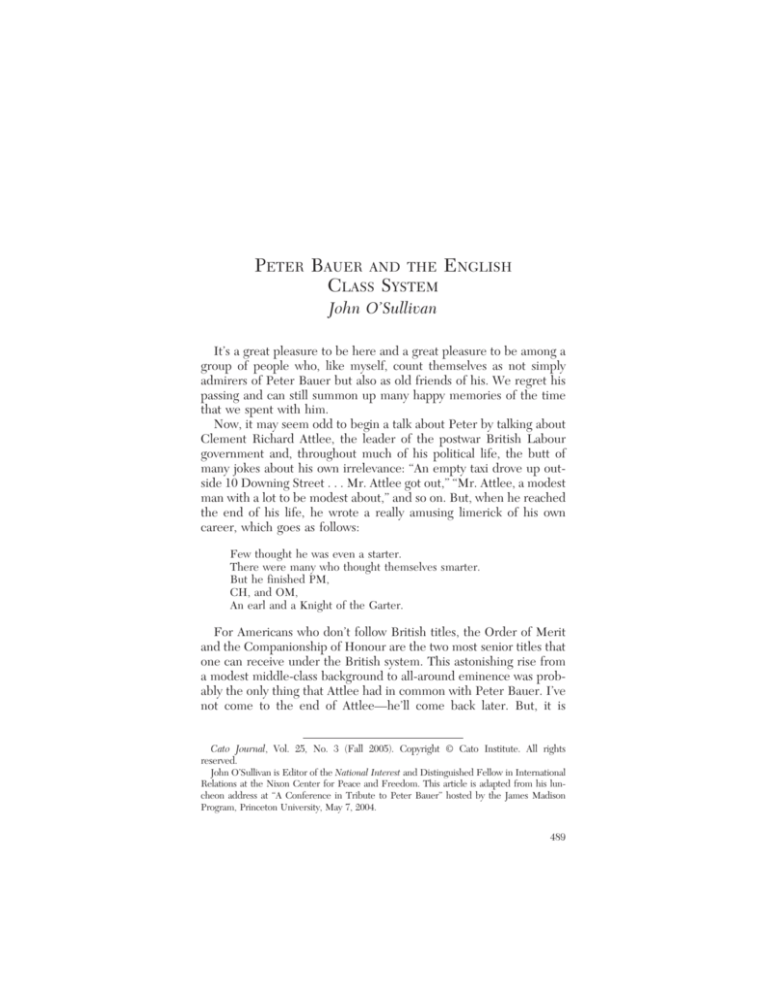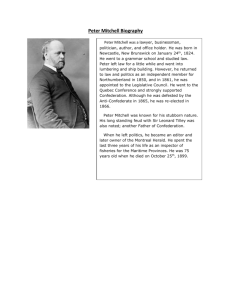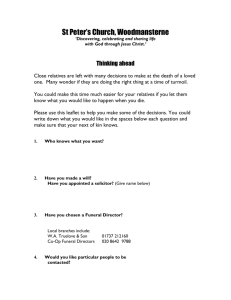
PETER BAUER AND THE ENGLISH
CLASS SYSTEM
John O’Sullivan
It’s a great pleasure to be here and a great pleasure to be among a
group of people who, like myself, count themselves as not simply
admirers of Peter Bauer but also as old friends of his. We regret his
passing and can still summon up many happy memories of the time
that we spent with him.
Now, it may seem odd to begin a talk about Peter by talking about
Clement Richard Attlee, the leader of the postwar British Labour
government and, throughout much of his political life, the butt of
many jokes about his own irrelevance: “An empty taxi drove up outside 10 Downing Street . . . Mr. Attlee got out,” “Mr. Attlee, a modest
man with a lot to be modest about,” and so on. But, when he reached
the end of his life, he wrote a really amusing limerick of his own
career, which goes as follows:
Few thought he was even a starter.
There were many who thought themselves smarter.
But he finished PM,
CH, and OM,
An earl and a Knight of the Garter.
For Americans who don’t follow British titles, the Order of Merit
and the Companionship of Honour are the two most senior titles that
one can receive under the British system. This astonishing rise from
a modest middle-class background to all-around eminence was probably the only thing that Attlee had in common with Peter Bauer. I’ve
not come to the end of Attlee—he’ll come back later. But, it is
Cato Journal, Vol. 25, No. 3 (Fall 2005). Copyright © Cato Institute. All rights
reserved.
John O’Sullivan is Editor of the National Interest and Distinguished Fellow in International
Relations at the Nixon Center for Peace and Freedom. This article is adapted from his luncheon address at “A Conference in Tribute to Peter Bauer” hosted by the James Madison
Program, Princeton University, May 7, 2004.
489
CATO JOURNAL
interesting that the two men did, in a sense, start from nowhere and
end up at the very top of their chosen careers—at the very top of what
Disraeli called the “greasy pole.”
When Peter arrived in Britain in 1934, the penniless son of a
Budapest bookie, he spoke English hardly at all. At the time of his
death 50 years later, he was a peer of the realm, a fellow of the British
Academy, professor emeritus at the London School of Economics,
and the lifetime fellow of a Cambridge college. It is hard to beat
distinctions of that order. This rise to eminence did not seem to affect
or deeply mark Peter on the surface. He did not become haughty,
arrogant, or snobbish. But I believe that it did deeply influence Peter’s view and concept of his adopted country. It made him, in my
view, an English patriot of a very distinctive kind.
He saw England, as many East European refugees and exiles
saw England in the 1930s, as a successful liberal society. I think he
personally found it a congenial place. But he lived to see many of
the features of English life he admired either abandoned or fallen
into decay. And he joined in the last great campaign to restore that
kind of liberalism—that kind of conservative liberalism—that Lady
Thatcher led in the 1980s.
That is the theme of what I want to say today. But this talk is not
a systematic analytical examination of Peter’s ideas in economics or in
social philosophy. There are many other people here who are better
qualified, both by their discipline and by their knowledge of his work,
to do that. These remarks are rather to be seen as reminiscences
based, in part, on my working with Peter on a number of articles in
the 1970s and 1980s and on maintaining a friendship with him until
the end of his life.
Peter liked journalists. I was one of several whom he sought as
collaborators on various articles. We used to collaborate around his
dinner table: having first an extremely good dinner, then sitting down
to work for two or three hours, and then finally when he felt we had
done enough, being allowed to have a nice glass of port before going
home. Those occasions were as much tutorials as working dinners. He
would throw out all kinds of questions, test your knowledge, and
generally turn the whole thing into a tremendously entertaining
game.
I remember on one occasion—I believe this test is familiar to
economists, but it wasn’t to me—he asked Frank Johnson (an editorial writer for the Daily Telegraph and later editor of the Spectator)
and me, “Tell me: A professor goes on holiday to Cyprus. He is
well-known and respected. He returns home having paid his holiday
bill with a single check. The man is so well-known and respected in
490
BAUER
AND THE
ENGLISH CLASS SYSTEM
Cyprus that the check is never presented to his bank in England but
instead circulates around Cyprus with people endorsing it and reendorsing it endlessly. Who will pay for his holiday?” Frank and I
discussed it and then we eventually agreed that the entire population
of Cyprus would pay for his holiday as a result of the small increase
in the money supply that his check represented. Peter said we might
be right—there was some dispute about this among economists.
Then about a week later, he rang up and he said, “What you and
Frank concluded on that occasion has just been empirically verified.
There has been a bank strike in Ireland for the last month. It has now
ended. But it has been discovered that during that period the people
kept their spending going by endlessly endorsing checks, one after the
other. And, in the course of the month, they have just written themselves a 12 percent increase in the money supply.”
Well, from these dinner debates over a period of years, one got a
good grasp of Peter’s mind, of how it worked, of his attitudes, and so
on—in particular, I think, about his attitudes toward his adopted land.
Britain in the 1930s
Now, in one respect, Peter was not an uncommon figure. Britain in
the 1930s was a haven for many people from Eastern and Central
Europe, particularly intellectuals. It was also, as I said, a successful
liberal society. It was a democratic society too. Yet it didn’t seem to
Peter to have the vices that other democratic societies developed: it
wasn’t leveling, it wasn’t intrusive, privacy was respected, and institutions had an independence, which in other countries governments
restricted. It managed to be more stable and prosperous than other
societies of that kind.
I several times interviewed F. A. Hayek before his death, and he
said something very similar. He said to me, “England was the first
place I felt at home, and the Reform Club the place where I felt most
at home.” I can’t explain that myself. I’ve been a member of the
Reform Club for more than 30 years and I was once a mere two deaths
away from having a permanent bedroom there, but I would hesitate
to think of it as home. It’s a pleasant sort of place and I’m glad that
they’ve allowed me to stay in, but it doesn’t seem to me to be a very
domestic place. But as Hayek and Peter in different ways both said,
it reminded them that this was a country in which you were allowed
a good deal of privacy—and this was true of social life as it was of
political regulation. Or, as Hayek once said, “I like England because
English people can break off a conversation without giving offense.”
491
CATO JOURNAL
Hayek was an established academic, as were many others when
they arrived. Peter was in a very different situation and might have
had a very different experience. He had no money, he spoke no
English, he had no degree at that point (being in the middle of a law
degree in Budapest). He had come to Cambridge at the urging of a
friend of his father’s and also because he wanted to study under two
distinguished international lawyers. Peter simply turned up one day in
Cambridge in March 1934 and presented himself at half a dozen
colleges at the tutorial hour of the senior tutors. Remarkably, he got
five acceptances, and from them he chose Caius.
In 1985, Peter discussed those early days and his early memories of
Caius in an interview with the Caius magazine, The Caian, in which
he made plain—here I’m coming to the point about class—how well
he was received. Let me just read you his own words:
I had serious problems. I was gauche and ignorant, both of the ways
of the country and of the language. I found it very difficult to follow
the lectures or even ordinary conversation. I had never read a book
on economics or on economic history before coming to Cambridge.
I did not know where coal was being mined. I could not have
managed to get through Part 1, let alone get a First, had it not been
for the great help I received . . . . I also had very little money, much
less than the Miners Federation of Great Britain allowed to the
undergraduate whom they sponsored in Cambridge. From midFebruary 1935 to the examinations I hardly ever had a proper meal
for lunch, only coffee and crisps. In my second year I was awarded
an Exhibition which eased my financial position considerably.
In summing up his experience, Bauer notes:
I encountered no prejudice of any kind and experienced friendliness, hospitality and tolerance. The notion that this college or Cambridge generally was then pervaded by xenophobia, anti-Semitism
and exclusiveness is simply untrue. I believe this widely held view
has been reinforced by the film Chariots of Fire [then recently out,
and this hostile view has been since reinforced by the series on
British television about the Cambridge spies]. I did not see this film,
but I had read enough reviews and heard enough comment to know
that it would make me very angry.
Now, that was Peter’s personal experience, and I believe it was a
terribly important shaping. It does carry a possible objection to itself,
of course. Was not, perhaps, Caius an oasis in an otherwise intolerant
country? Well, Peter did not dismiss that possibility. He did acknowledge that there was some intolerance in Britain. He thought it relatively low by the standards of other countries. More to the point,
he was impressed by the fact that it was possible for independent
492
BAUER
AND THE
ENGLISH CLASS SYSTEM
institutions like Caius to ignore popular sentiment and opinion even
when that was very powerful and strong.
In his interview, he cited two episodes in which there was a wave,
as he put it, of xenophobia sweeping the country. The first was after
Klaus Fuchs was revealed to be an East German agent. It was at that
point that Peter was up for a fellowship, and the college simply went
ahead and appointed him even though, as Peter himself says, it would
not have been perhaps surprising if people had been suspicious of
Central Europeans from then-communist countries. The second was
after the battle in which the “Glorious Glosters,”—a Gloucestershire
regiment, fought bravely in a Korean war engagement but was decimated by the Chinese. The college appointed a Chinese student to a
fellowship who, in addition to being from communist China, made
plain to the selection board that he intended after the period of the
fellowship to return and continue his work there.
It impressed Peter, I think, that Britain was a society in which
independent institutions could defy popular whims. And, in a slightly
different context, as the scholar Shirley Robin Letwin has said, the
superiority of a liberal society is demonstrated by the fact that it
allows enclaves of socialism and communism to operate within itself.
A communist society does not allow such enclaves and, indeed, will
treat those people who behave in capitalist ways—like, for example,
manufacturing and selling pencils—by imposing heavy sanctions on
them right up to the death penalty. And they do not accept capitalism
inside their own society for the very good reason that too many people
would become capitalist.
When he came to consider British society more broadly in the light
of his own experience, Peter discovered that he was often, as Basil
Yamey said, in the minority and in opposition to the general point of
view. He found in this case that he was confronting a powerfully
entrenched myth—namely, that Britain was a rigid and oppressive
class society. Malcolm Muggeridge once said that intellectuals have
sex on the brain, which is a very uncomfortable place to have it. Peter
replied, no, that was not true. The intellectuals actually had class on
the brain, and he cited numerous cases of intellectuals asserting that
Britain was a society in which movement across classes was more or
less impossible because of the rigidity of class barriers.
Peter denied this. In his essay, “Class on the Brain,” first published
in 1997 and reprinted in From Subsistence to Exchange, he argued
that Britain was, in fact, a very open society. And he was able to cite
plenty of statistics to buttress his view. He cited all the latest social
science evidence demonstrating the openness and social mobility of
Britain, which was approximately equal to that of Australia and the
493
CATO JOURNAL
United States. In fact, he then cited something most interesting,
which is a report from the magazine New Society. Let me read it to
you:
Over the past few months, John Goldthorpe and his colleagues in
Nuffield College, Oxford, have begun to publish the results of their
analysis of social mobility in Britain. . . . And these, for once, challenge rather than reinforce stereotypes. For they show that Britain
is a much more mobile society than the received wisdom suggests:
that we are a surprisingly open society, with people moving up and
down the occupational escalators in a bewilderingly complex pattern. For example, only a quarter of those in social class 1—managers and professionals—had fathers in the same category: rather
less than the proportion drawn from a manual working-class background. . . . Nor is the loud silence which has accompanied the
publication of these findings an isolated example of the reaction to
research which doesn’t fit easily into conventional pigeonholes.
Now, even though the latest social science research confirmed
Peter’s skepticism about the “rigid class” theory, statistics were not for
Peter very often the decisive matter. I remember having dinner with
him on one occasion, and he asked me what I thought of national
income statistics. I said I supposed they were okay. He replied that I
ought to know they were nonsense. He argued from this example:
“Did you have a good dinner tonight?” And I said, “Yes, very good.”
He said, “No you didn’t! It was a terrible dinner! Last year when you
came, you had an excellent dinner. That’s because my housekeeper
has changed in the meantime. In the last year, my standard of living
has taken a dramatic fall—but that is nowhere registered in the national income statistics!”
When it came to the question of Britain and social class, therefore,
Peter relied first of all on his own experience—which you’ve heard
about—and second on the anecdotal evidence of the men and
women who have risen to the top of British society from humble
positions. Anecdotalism is not held in high regard by social science
today, but the sheer accumulation of evidence in the number of
careers of poor but successful people in his book is powerfully persuasive; it goes on for page after page. Those of us who knew Peter
know that he could cite an almost endless edition on separate examples as well.
I will just confine myself to one passage, which is describing people
who have reached the top of politics:
Disraeli was prime minister from 1866 to 1868 and 1874 to 1880;
Lloyd George, a very poor orphan brought up by an uncle who was
a shoemaker, was chancellor of the exchequer by 1908 and prime
494
BAUER
AND THE
ENGLISH CLASS SYSTEM
minister from 1916 to 1922; and Ramsay MacDonald, illegitimate
son of a fisherwoman, was prime minister in 1923–1924 and from
1929 to 1935. None of them had been to university. Lloyd George
and MacDonald had elementary education only, and Disraeli attended a relatively unknown secondary school. More recently, although Mr. Heath and Mrs. Thatcher went to university, their backgrounds are not exactly upper-class. Nor, of course, were those of
Mr. Wilson, Mr. Callaghan, Mr. Healey, Mr. Kinnock, and Mr.
Smith [all leaders of the Labour Party]. Mr. Major, of course, came
from a very modest background and left school at the age of sixteen
with only two O- levels. Of the contenders for the leadership of the
Conservative Party in 1997, Mr. Clarke, Mr. Hague, Mr. Howard,
and Mr. Redwood all went to state schools and were, respectively,
the sons of a watchmaker, a small businessman, a Romanian refugee, and a cost accountant.
The truth, as it emerged in Peter’s arguments and as I believe to be
the case myself, is that Britain is a class society insofar as classes exist
and are denoted by accent, clothes, education, and taste. These
classes exist, though they have changed very remarkably in the last 40
years. The existence of these classes gave society balance and stability—you might say that Britain was a sort of community of communities. But it was easily possible for people to rise and fall from one
class to another; to become what Bernard Shaw called “upstarts” and
“downstarts.” And when they did that, they simply adapted to the
manners of their new class position; or, as Ogden Nash put it, “In
America, a rich butter and egg man is simply a rich butter and egg
man. But in England, he is Sir Benjamin Buttery Bart”—Bart. being
the compression for Baronet.
New Obstacles to Class Mobility
It was not, therefore, a society that was rigid but a society open to
talent. Peter then went on to point out that, ironically, the changes
since 1934 designed to ameliorate its alleged rigidity and to reduce
class distinctions—and to replace them with either merit or equality—had in fact led to the erection of new barriers to advancement
that in some respects were greater obstacles than the class barriers of
1934. He himself pointed out in the interview I mentioned that it
would not be possible today for a young man to arrive in Cambridge
with no financial backing, speaking no English, and to be accepted
into the college and given the assistance that he was given.
Of course, Americans will recognize the same situation in this
country in which credentialism is increasingly a barrier to people who
discover that they have abilities later in life that were not detected by
495
CATO JOURNAL
them or by others at earlier times. And, as anyone who has been in a
position of having to hire or fire people knows, there is an additional
set of requirements that prevent talent from reaching its proper level
in the form of racial and gender preferences.
There is finally another consequence. In pursuit of these ideas,
particularly equality, the British government has recently intruded
upon the independence of the universities in a flagrant manner. Caius
and all the other institutions whose independence Peter valued have
fallen under the sway of philistine social engineers, who regard academic excellence as, at best, a secondary consideration. It is to Peter’s
reaction and resistance to this creeping egalitarian intrusion that I
now turn.
Peter’s role in developing and advancing what is now called
Thatcherism has never been given, in my view, proper credit. But it
was a very major one. First of all, Peter was part of the revival of
classical liberalism in Britain. I date that from 1957, when the Institute of Economic Affairs (IEA) was founded by Ralph Harris and
Arthur Seldon. Peter was one of the major figures, along with others
present like Basil Yamey, in the IEA network that then spread. The
IEA published his work on development economics and these ideas
subsequently began to influence conservative politics from the 1960s
onward. Lady Thatcher herself learned them from Sir Keith Joseph;
and Sir Keith himself from Peter Bauer’s personal influence.
In fact, there was one occasion in which Sir Keith was giving a talk
in a suburban constituency and a man stood up and asked for his
opinion of government aid. Sir Keith gave a characteristically anguished reply. He said, “Well, as a believing and practicing Jew with
a strong respect and attachment to the Jewish tradition of philanthropy, I really feel we have an obligation to help these countries that
are poorer than ourselves. On the other hand, I’ve recently been
reading the works of Professor P. T. Bauer, who argues that foreign
aid is an actual obstacle to development and serves to assist the
oppression of poor people by their despotic governments. But what
do you think?” The man replied, “I am Professor P. T. Bauer.” They
went on to become good friends or, as I think Keith would have put
it, teacher and pupil.
Second, Peter was a member of the influential intellectual salon
around Shirley Robin Letwin and her husband Bill, both Americans,
incidentally, from Chicago. That circle included Michael Oakeshott,
F. A. Hayek, Enoch Powell, Arthur Shenfield, Kenneth Minogue, and
many others. It was the center of an enormous amount of early
conservative rethinking, and through its contacts, a strong influence
on the Tory rethinking of the 1970s. Mrs. Letwin’s son Oliver, by the
496
BAUER
AND THE
ENGLISH CLASS SYSTEM
way, is now a leading figure of the Conservative frontbench and one
of a troupe of talented Cambridge graduates who Shirley brought into
the cadre of conservative intellectuals.
Third, Peter played a role directly in conservative organizations.
Notably, he was an active member of the conservative philosophy
group that used to meet in the houses of the Members of Parliament
in the 1970s. A paper would be read—Oakeshott first delivered his
distinction between civil and enterprise associations to that group.
Dinner would be served. Then, after dinner, there would be a lively
debate. Lady Thatcher often attended—she has never really stopped
being an attentive student. And Peter was a strong, witty, effective
debater on those occasions. Because he was of a conservative disposition as well as a convinced exponent of classical liberal positions, he
persuaded many otherwise nervous traditional Tories to adopt the
risky business of monetarism, deregulation, and the reform of the
trade unions.
Fourth, Peter had strong links to journalism and many friends
among journalists. He wanted our help in some ways because, although a good writer, Peter did suffer from one thing: he wanted to
distill every sentence so that it not only contained his central point but
also was armored against every possible objection to it. The result was
a kind of armadillo prose, which limped slowly across the page. He
believed also, like Hayek, that journalism was vital to getting out the
truth to the wider public. One of Peter’s most familiar phrases to us
all was, “What matters in the modern world is not the voice, but the
echo.” He was very friendly with journalists like Colin Welsh, Paul
Johnson, Andrew Alexander, who is here, Perry Worsthorne, and
others. In fact, I remember one occasion in which Frank Johnson was
working with Peter on something. Frank used to try to prove Peter
was wrong, largely from motives of mischief. On one occasion he said,
“I’ve just been reading the works of this man, Professor J. K. Galbraith. And he says your arguments on the market, they’re all wrong.
He says that corporations now control the market through advertising,
and they’ve abolished consumer sovereignty. What’s your reply to
that?”
Peter said, “What is my reply to that? What is my reply to that?
Why don’t you play me a pop song and ask me what is my reply to
that?”
Anyway, Frank and he collaborated for many years very happily.
Frank was, like me, on the staff of the Daily Telegraph. And Peter’s
relationship with the Telegraph is I think important and interesting.
Peter was one of our gurus when I was on the staff at the time. We
ran articles by him and his name often appeared in other people’s
497
CATO JOURNAL
articles as well. In retrospect the Daily Telegraph in the 1970s, particularly, was a key institution in developing a classical liberal critique
of the Tory-Left consensus under Ted Heath and in developing the
set of ideas that subsequently Lady Thatcher picked up and that
became known as Thatcherism.
What were the results of Peter’s efforts in all these fields? First of
all, the British economy was significantly reformed in the 1980s. It is
now a successful enterprise economy, and that success has been entrenched by the fact that both major parties accept the market as the
basis of the economy. There was, secondly, relatively little change in
the British government’s foreign aid policy under the Thatcher governments. Jim Buchanan will not need to be told the reason: it’s
directly related to his theory of public choice economics. The political
costs of curtailing government-to-government aid were very substantial and the fiscal gains were extremely modest. And, for that reason,
Peter’s views on this were never developed by the Conservative governments. Still, Peter himself became a peer, something of which he
was very proud. Lady Thatcher selected him for the peerage partly
because of his past work and also, as a working peer, she wanted him
actually to add intellectual support in the House of Lords. Perhaps,
too, she was tired of hearing Peter complain that the Tories, unlike
Labour, never rewarded their academic friends. At any rate, she shut
him up on that one.
Now, to have been a pioneer of Thatcherism is not universally
regarded as a sign of virtue. In recent years, the Tory governments of
the 1980s have been under attack from two directions. First, the Left
has condemned their neglect of society, misquoting her phrase,
“There is no such thing as society”—I’ll be happy to explain the
origin, if you’re interested—and ascribing such developments as the
increased crime, family breakdown, the growth of the underclass, and
the social pathologies to this alleged neglect of society. That analysis
has, secondly, been repeated in a slightly different way by some
traditional conservatives. And they see the same social pathologies as
a result of the weakening of traditional British institutions, such as the
civil service, neighborhood organizations, and even trade unions under the pressures of individualism and market forces.
What weakens these two critiques in my view, however, is the
matter of dates. When did these pathologies start? When did crime
start to rise? Illegitimacy to increase? Family breakdown to get seriously worse? Divorce figures rocket? And so on. Well, we do in fact
know precisely when this started to happen. The sociologist Christie
Davies, a friend of Peter’s incidentally, has recently pointed out in his
book The Strange Death of Moral Britain, that we can date the major
498
BAUER
AND THE
ENGLISH CLASS SYSTEM
changes of this kind—in particular the crime and illegitimacy figures
beginning to rise—from 1955. The other changes follow in inexorable
succession. By 1978, the socialist writer Jeremy Seabrook lamented in
his significantly titled book What Went Wrong? how low-income
council estates were squalid and crime-ridden, how crime was increasingly endemic, how illegitimacy was rising, how families would
be weakened, how an underclass had been created.
The upheavals of the following year’s winter of discontent were
eloquent testimony to the fact that the social cement of fellowship
and community feeling had already crumbled away. Mrs. Thatcher is
open to criticism for failing to tackle some of these pathologies in the
years that followed. I would argue myself that she had no alternative
but to tackle the more pressing problems of economic decline, inflation, and the Soviet threat first. But whether I am correct in that or
not, Thatcherism can hardly be held responsible for events that began
24 years before she entered office.
Now, this may seem to have taken us slightly away from the topic
of Peter Bauer. Not so. It directly relates to Peter’s view of Britain’s
society. Davies’ book I mentioned a moment ago divided modern
Britain into three stages. Between 1830 and 1890, there was “reforming Britain,” in which major social, political, economic, electoral, and
moral changes and reforms were introduced, transforming society,
particularly changing the lower orders into the respectable working
class. From 1890 to 1955, there was “respectable Britain,” which I’ll
come back to. And since 1955 to the present, we’ve had “permissive
Britain.”
Now, it was respectable Britain to which Peter emigrated in 1934.
That society was, as we have seen, a class society—but a mobile and
liberal one. It was also a stable society; a religious society; a society
marked by strong families, gentleness of manners, moral values of
self-help, diligence, and respectability. It is easy to mock that kind of
society, and I would not deny that aspects of it were stifling. But then,
as Samuel Butler remarked, those who condemn respectability as a
tepid and inadequate imitation of real virtue usually turn out to be the
very same people who cannot live up to its inexacting requirements.
The society I’m describing was liberal in its economic and political
arrangements, hence the independence of Caius that so impressed
Peter. But it was conservative and even Puritan in its social customs
and behavior. And the first political virtues rested on the second social
ones. These two sets of virtues permeated all classes, except the
intelligentsia and possibly the aristocracy. It took a great deal to knock
the stuffing out of respectable Britain. Even after two world wars and
an economic slump, it was still going reasonably strong in the early
499
CATO JOURNAL
1950s when I was in school. I still remember its dull and endless
Sundays vividly.
What finally broke it, or so it seems to me, were the unintended
consequences of the welfare state. Respectable Britain began to die
after all in 1955, 10 years after the Attlee government was elected and
5 years after all the major welfare, socialist measures that it enacted.
What we did in those measures and what we later augmented with the
liberal social measures of the 1960s was to tell people that the Puritan
self-restraints of respectable Britain were no longer necessary in an
affluent society, and that there need be no or very few limits to the
pursuit of personal autonomy.
Many other factors—cultural, economic, and social—played a role
in this. And the same effects can be seen in different times and at
different paces in other countries. But the end results were the social
pathologies described, which then brought about an extension of state
power and bureaucracy to cope with those pathologies, and finally the
extension of that power over independent social institutions, like the
universities that Peter valued so highly. Peter foresaw this. He opposed these developments while they were happening; he regretted
what had been lost; and he attempted where he could in the policies
of the 1980s to reverse those things—which brings me back, finally,
to Clement Attlee.
Attlee was a child of the respectable Britain, as Peter was an immigrant to it. Attlee was a very creditable child: he was modest,
happily married, a former soldier (known as Major Attlee for his early
political career), a man with a social conscience (he worked at a
charitable settlement in East London), famous for his silence (so that
he was almost the British version of Calvin Coolidge), and conventional in his tastes and social opinions.
Just how conventional is revealed by this perhaps apocryphal story:
When he was Prime Minister, one of his ministers was John Strachey,
a well-known writer and intellectual who while in government
amused himself by writing a slim volume of poetry. Under the Official
Secrets Act, any book that a minister writes has to be cleared by the
Prime Minister before publication. Strachey sent the book of poems
to Attlee. He didn’t hear anything about it. Some months went by. So,
at the end of a ministerial meeting with the Prime Minister, he took
advantage of the fact to raise the question of his book. He said, “By
the way, Prime Minister, I suppose there’s no objection to my publishing that little book of verse I sent you.” Attlee replied, “Oh, I’m
afraid there is, Strachey.” Strachey was completely baffled and said,
“May I ask you why, Prime Minister?” And Attlee said, “Certainly. I
read the poems. Don’t rhyme, don’t scan.”
500
BAUER
AND THE
ENGLISH CLASS SYSTEM
Precisely because he was so conventional, Attlee took respectable
Britain for granted. He did not have the imagination to see that the
kind of measures that he introduced for what he thought was the good
of the country might undermine the social virtues of which he himself
was such a distinguished ornament. Peter Bauer, like other émigrés
such as Hayek, saw that the England he arrived in was not only not a
rigid, oppressive society but that it was a very unusual society in the
combination of virtues it had reconciled. We have restored the economic foundations of that society—Britain is now a very successful
European economy. But we still need to restore the social cohesion
and decency that made liberal freedom work. That is the task that
remains to be done. It is a great pity that we won’t have Peter to assist
us in doing it.
501








